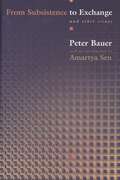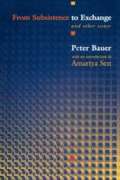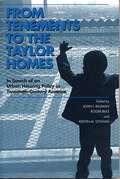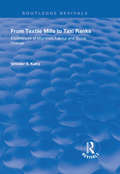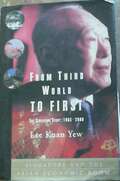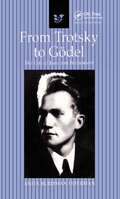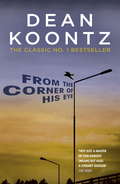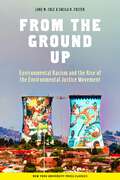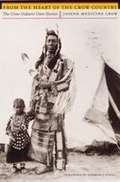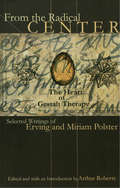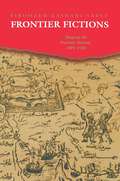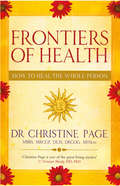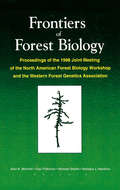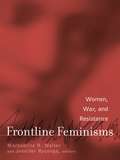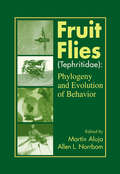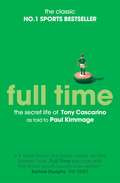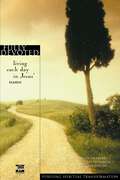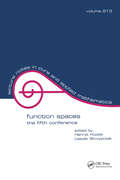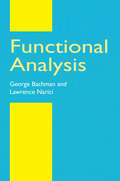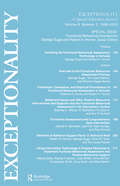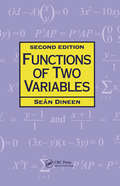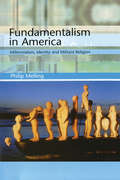- Table View
- List View
From Subsistence to Exchange and Other Essays (New Forum Books #32)
by Peter Tamas BauerPeter Bauer, a pioneer of development economics, is an incisive thinker whose work continues to influence fields from political science to history to anthropology. As Nobel Laureate Amartya Sen writes in the introduction to this book, "the originality, force, and extensive bearing of his writings have been quite astonishing." This collection of Bauer's essays reveals the full power and range of his thought as well as the central concern that underlies so much of his diverse work: the impact of people's conduct, their cultural institutions, and the policies of their governments on economic progress. The papers here cover pressing and controversial issues, including the process that transforms a subsistence economy into an exchange economy, the reputed correlation between poverty and population density, the alleged responsibility of the West for Third World poverty, the often counterproductive results of foreign aid, and the effects of egalitarian policies on individual freedoms. Bauer addresses these and other matters with clarity, verve, and wit, combining his deep understanding of economic theory and methodology with keen insights into human nature. The book is a penetrating account of how to develop a prosperous economy alongside a free and fair society and a stimulating introduction to the work of a man who has done so much to shape our modern understanding of developing economies and of the relationship of economics to the other social sciences. "This selection of essays will give readers a wonderful opportunity to learn about the rich world of cognizance and analysis erected by one of the great architects of political economy. I feel privileged to be able to offer this letter of invitation."--From the introduction by Amartya Sen, Nobel Laureate in economics
From Subsistence to Exchange and other Essays
by Peter BauerPeter Bauer, a pioneer of development economics, is an incisive thinker whose work continues to influence fields from political science to history to anthropology. As Nobel Laureate Amartya Sen writes in the introduction to this book, "the originality, force, and extensive bearing of his writings have been quite astonishing." This collection of Bauer's essays reveals the full power and range of his thought as well as the central concern that underlies so much of his diverse work: the impact of people's conduct, their cultural institutions, and the policies of their governments on economic progress. The papers here cover pressing and controversial issues, including the process that transforms a subsistence economy into an exchange economy, the reputed correlation between poverty and population density, the alleged responsibility of the West for Third World poverty, the often counterproductive results of foreign aid, and the effects of egalitarian policies on individual freedoms. Bauer addresses these and other matters with clarity, verve, and wit, combining his deep understanding of economic theory and methodology with keen insights into human nature. The book is a penetrating account of how to develop a prosperous economy alongside a free and fair society and a stimulating introduction to the work of a man who has done so much to shape our modern understanding of developing economies and of the relationship of economics to the other social sciences.
From Tenements to the Taylor Homes: In Search of an Urban Housing Policy in Twentieth-Century America (G - Reference, Information and Interdisciplinary Subjects)
by John F. Bauman Roger Biles Kristin M. SzylvianAuthored by prominent scholars, the twelve essays in this volume use the historical perspective to explore American urban housing policy as it unfolded from the late nineteenth through the twentieth centuries. Focusing on the enduring quest of policy makers to restore urban community, the essays examine such topics as the war against the slums, planned suburbs for workers, the rise of government-aided and built housing during the Great Depression, the impact of post–World War II renewal policies, and the retreat from public housing in the Nixon, Carter, and Reagan years.
From Textile Mills to Taxi Ranks: Experiences of Migration, Labour and Social Change (Routledge Revivals)
by Virinda S KalraThis title was first published in 2000: Contemporary academic studies on economic activity and South Asians in Britain have tended to concentrate on self-employment and entrepreneurial business success, and it may be possible to forget that many South Asians came to Britain to work in declining manufacturing industries. The phrase "from textile mills to taxi ranks" is not only a metonym for the movement to a service sector economy, but also presents a shift in place of work for many (Azad) Kahmiri/Pakistani men. The author explores the way in which issues of employment, work, income generation and economic status affect, and are affected by, a section of the Mirpuri/Pakistani "community" based in Oldham. The men discussed have strong emotional, spiritual and material ties to the geographical district of Mirpur and stories of workers and industry, home and aborad, dreams and realities, merge and entwine with the practices of everyday life.
From Third World to First: The Singapore Story: 1965-2000
by Lee Kuan YewFew gave tiny Singapore much chance of survival when it was granted independence in 1965. How is it, then, that today the former British colonial trading post is a thriving Asian metropolis with not only the world's number one airline, best airport, and busiest port of trade, but also the world's fourth–highest per capita real income? The story of that transformation is told here by Singapore's charismatic, controversial founding father, Lee Kuan Yew. Rising from a legacy of divisive colonialism, the devastation of the Second World War, and general poverty and disorder following the withdrawal of foreign forces, Singapore now is hailed as a city of the future. This miraculous history is dramatically recounted by the man who not only lived through it all but who fearlessly forged ahead and brought about most of these changes. Delving deep into his own meticulous notes, as well as previously unpublished government papers and official records, Lee details the extraordinary efforts it took for an island city–state in Southeast Asia to survive at that time.
From Trotsky to Gödel: The Life of Jean van Heijenoort
by Anita Burdman FefermanThis story of a highly intelligent observer of the turbulent 20th century who was intimately involved as the secretary and bodyguard to Leon Trotsky is based on extensive interviews with the subject, Jean van Heijenoort, and his family, friends, and colleagues. The author has captured the personal drama and the professional life of her protagonist--ranging from the political passion of a young intellectual to the scientific and historic work in the most abstract and yet philosophically important area of logic--in a very readable narrative.
From the Corner of his Eye: A breath-taking thriller of mystical suspense and terror
by Dean KoontzAll he wanted was to make his mother proud... Dean Koontz's From the Corner of His Eye is an unforgettable thriller of suspense, danger and the supernatural. Perfect for fans of Stephen King and Richard Laymon.'A wonderful read. The pacing is perfect, keeping the reader in exquisite tension. This is a deeply satisfying, rich novel. You may have nightmares about [the villain] but you'll love the other characters. Singularly and collectively, they are unforgettable. From the Corner of His Eye is magic' - New Orleans Times-PicayuneBartholomew Lampion was blinded at the age of three, when surgeons reluctantly removed his eyes to save him from a fast-spreading cancer. But although eyeless, Barty regained his sight when he was thirteen.This sudden ascent from a decade of darkness into the glory of light was not brought about by a holy healer. No celestial trumpets announced the restoration of his vision, just as none had announced his birth.A rollercoaster had something to do with his recovery, as did a seagull. And you can't discount Barty's profound desire to make his mother proud of him before she died.The first time she died was the day Barty was born. January 6, 1965. What readers are saying about From the Corner of His Eye: 'At one stage I was so shocked by what happened I had to reread a few pages to make sure I hadn't misread... the twist was so surprising and so unexpected''This book had twists and turns to the last word''One of the best books I've ever read'
From the Ground Up: Environmental Racism and the Rise of the Environmental Justice Movement (Critical America #34)
by Luke W. Cole Sheila R. FosterA critical look at the movement for environmental justiceWhen Bill Clinton signed an Executive Order on Environmental Justice in 1994, the phenomenon of environmental racism—the disproportionate impact of environmental hazards, particularly toxic waste dumps and polluting factories, on people of color and low-income communities—gained unprecedented recognition. Behind that momentous signature, however, lies a remarkable tale of grassroots activism and political mobilization. Today, thousands of activists in hundreds of locales are fighting for their children, their communities, their quality of life, and their health.From the Ground Up critically examines one of the fastest growing social movements in the United States—the movement for environmental justice. Tracing the movement's roots, Luke Cole and Sheila Foster combine long-time activism with powerful storytelling to provide gripping case studies of communities across the US—towns like Kettleman City, California; Chester, Pennsylvania; and Dilkon, Arizona—and their struggles against corporate polluters. The authors use social, economic and legal analysis to reveal the historical and contemporary causes for environmental racism. Environmental justice struggles, they demonstrate, transform individuals, communities, institutions and the nation as a whole.
From the Heart of the Crow Country: The Crow Indians' Own Stories
by Herman J. Viola Joseph Medicine CrowThe world of the Crow Indians comes to life in this extraordinary collection of stories from respected elder and famed storyteller Joseph Medicine Crow. Raised by traditional grandparents, who remembered life before the reservation days, MedicineøCrow as a child would listen to stories that his grandfather and other elders told during sweat baths. He also learned about the Indian wars of earlier years from White Man Runs Him, one of Custer's Crow scouts. Medicine Crow became a passionate collector of stories and information about Crow life and history. This volume is a fascinating and informative collection of legends, humorous tales, history, and detailed accounts of life and culture, all told from Crow points of view.
From the Radical Center: The Heart of Gestalt Therapy
by Erving Polster Miriam PolsterThis remarkable collection traces central themes in the work of Erving and Miriam Polster, two of the best-known and best loved Gestalt therapists in the world. The writings herein span 4 decades in the history of psychotherapy, bringing together practical, theoretical and aesthetic dimensions of the Polsters' work in a single book. Ranging across diverse subjects and distinct historical periods, the work collected in this volume will educate, provoke, inspire and nourish Gestalt therapists for years to come.
Frontier Fictions: Shaping the Iranian Nation, 1804-1946
by Firoozeh Kashani-SabetIn Frontier Fictions, Firoozeh Kashani-Sabet looks at the efforts of Iranians to defend, if not expand, their borders in the nineteenth and early twentieth centuries, and explores how their conceptions of national geography influenced cultural and political change. The "frontier fictions," or the ways in which the Iranians viewed their often fluctuating borders and the conflicts surrounding them, played a dominant role in defining the nation. On these borderlands, new ideas of citizenship and nationality were unleashed, refining older ideas of ethnicity. Kashani-Sabet maintains that land-based conceptions of countries existed before the advent of the modern nation-state. Her focus on geography enables her to explore and document fully a wide range of aspects of modern citizenship in Iran, including love of homeland, the hegemony of the Persian language, and widespread interest in archaeology, travel, and map-making. While many historians have focused on the concept of the "imagined community" in their explanations of the rise of nationalism, Kashani-Sabet is able to complement this perspective with a very tangible explanation of what connects people to a specific place. Her approach is intended to enrich our understanding not only of Iranian nationalism, but also of nationalism everywhere.
Frontiers Of Health: How to Heal the Whole Person
by Dr Christine PageFrontiers of Health is an essential guide to healing, combining medical expertise with unique insights into the human condition. Dr Christine Page illuminates our understanding of disease and its purpose for inner spiritual growth. In this excellent introduction to our subtle anatomy, Dr Page explores the chakras and their individual relationship to disease, pathology and soul unfoldment. Drawing upon her experience as a respected doctor, and observations of the many patients who have been her greatest teachers, Dr Page asks us to look fully at wholeness on all levels: body, mind and spirit.· 'A must for professional carers and aspiring healers' Light, The College of Psychic Studies· 'Fascinating and packed full of thought-provoking advice' Healthy Eating· 'A clearly written, very impressive and important bridge-building book ... for the first time, one can see exactly how healing comes from within the subtle bodies being reflected in their physical counterpart' Aromatherapy Quarterly· '... straightforward, comprehensive and clear. I applaud this very worthwhile book' New Humanity · 'There are some books that are written in such a way that you feel you are reading a letter from a friend. Frontiers of Health is one of them ... without doubt an important and far-sighted work in the field not only of health but also of human consciousness' The London Connection
Frontiers of Forest Biology: Proceedings of the 1998 Joint Meeting of the North American Forest Biology Workshop and the Western
by A K Mitchell Pasi Puttonen M Stoehr Barbara J HawkinsDiscover new approaches to promote a viable forest industry while protecting non-timber values!Frontiers of Forest Biology: Proceedings of the 1998 Joint Meeting of the North American Forest Biology Workshop and the Western Forest Genetics Association gives you significant new insights on current initiatives in forest biology. Because the field is changing rapidly, you need to keep aware of current trends, as the emphasis in forest research shifts from productivity-based goals to sustainable development of forest resources. In this volume, you will find a comprehensive summary of the state of the art of forest science in North America. Whether your focus is on genetics or on the environmental aspects of forest science, plant physiology, or silviculture, you will find helpful chapters by practitioners as well as cutting-edge research by scientists. This integrated approach is unique in the field. Based on the 1998 Joint Meeting of the North American Forest Biology Workshop and the Western Forest Genetics Association, Frontiers of Forest Biology addresses changing priorities in forest resource management. This important book contains fascinating research studies, complete with tables and diagrams, on topics such as biodiversity research, the productivity of commercial species, conserving adaptive variation in forest ecosystems, and the effect of harvesting trees on nutrient leaching.The book maps the frontiers of this fast-changing science with chapters on: the social, biological, and industrial context of forest biology new directions for research into genetics, physiology, plant silviculture, and conservation the impact of genetics on sustainable forestry the effects of cold and disease on plant physiology regeneration of various species after logging new species adapted for agroforestry the impact and management of exotic weedsFrontiers of Forest Biology offers solid information on a broad spectrum of topics and suggests fresh avenues for your investigations in all aspects of forest biology.
Frontline Feminisms: Women, War, and Resistance (Gender, Culture and Global Politics)
by Jennifer Rycenga Marguerite R. WallerFirst published in 2001. Routledge is an imprint of Taylor & Francis, an informa company.
Fruit Flies (Tephritidae): Phylogeny and Evolution of Behavior
by Martín Aluja Allen L. NorrbomFruit flies (Diptera: Tephritidae) are among the most destructive agricultural pests in the world, eating their way through acres and acres of citrus and other fruits at an alarming rate and forcing food and agriculture agencies to spend millions of dollars in control and management measures. But until now, the study of fruit flies has been traditi
Fulcanelli and the Alchemical Revival: The Man Behind the Mystery of the Cathedrals
by Geneviève DuboisSheds new light on the identity of the alchemist Fulcanelli• Provides new understanding of the relationships between the most important figures of the esoteric milieu of Paris in the first half of the 20th century• Includes a wealth of rarely seen documents, photos, and lettersFulcanelli, operative alchemist and author of The Mystery of the Cathedrals and The Dwellings of the Philosophers--two of the most important esoteric works of the twentieth century--remains himself a mystery. The true identity of the man who allegedly succeeded in creating the philosopher’s stone has never been discovered, despite ardent searches by many--even the OSS (the wartime U.S. intelligence agency, later to become the CIA) claimed to have looked for him following the end of World War II. Geneviève Dubois looks at the esoteric milieu of Paris at the turn of the century, a time that witnessed a great revival of the alchemical tradition, and investigates some of its salient personalities. Could one of these have been this enigmatic man, reported to have last appeared in Seville, Spain, in 1952 when he would have been 113 years of age?The trail followed by the author encounters such figures as Papus, René Guénon, Schwaller de Lubicz, Pierre Dujols, Eugene Canseliet, and Jean-Julien Champagne. Working from rare documents, letters, and photos, Dubois suggests that one of these men could have been hiding his activity behind the pseudonym of Fulcanelli or that Fulcanelli may even have been a composite fabricated by several of these individuals working together. Beyond its attempt to reveal the actual identity of Fulcanelli, Fulcanelli and the Alchemical Revival also presents an explanation of the alchemical doctrine and reveals the unsuspected relationships among the important twentieth-century truth seekers it highlights.
Full Dollarization
by Andrew Berg Eduardo BorenszteinA report from the International Monetary Fund.
Full Time: The Secret Life of Tony Cascarino
by Paul KimmageIn this compelling and sensationally honest book, Paul Kimmage strips away the public facade of an international football star. Tony Cascarino is a man scarred by childhood, haunted by indiscretion and troubled by a secret from his past. A man struggling to find answers as he speeds towards the most terrifying juncture in sport. The End.
Fully Devoted: Living Each Day in Jesus' Name (Pursuing Spiritual Transformation)
by John Ortberg Laurie Pederson Judson PolingWhat does it mean to do everything "in Jesus’ name"? Is that an ideal attainable only by a few "super Christians"--or is it a way of life we can all experience?Leader’s guide included!Fully Devoted group sessions are:What Is True Spirituality?GraceGrowthGroupsGiftsGiving"We Know Him Well . . . "
Function Spaces: The Fifth Conference (Lecture Notes in Pure and Applied Mathematics)
by Henryk Hudzik Leszek SkrzypczakThis volume compiles research results from the fifth Function Spaces International Conference, held in Poznan, Poland. It presents key advances, modern applications and analyses of function spaces and contains two special sections recognizing the contributions and influence of Wladyslaw Orlicz and Genadil Lozanowskii.
Functional Analysis
by Lawrence Narici George BachmanExcellent treatment of the subject geared toward students with background in linear algebra, advanced calculus, physics and engineering. Text covers introduction to inner-product spaces, normed and metric spaces, and topological spaces; complete orthonormal sets, the Hahn-Banach theorem and its consequences, spectral notions, square roots, a spectral decomposition theorem, and many other related subjects. Chapters conclude with exercises intended to test and reinforce reader's understanding of text material. A glossary of definitions, detailed proofs of theorems, bibliography, and index of symbols round out this comprehensive text. 1966 edition.
Functional Analysis in Applied Mathematics and Engineering (Studies In Advanced Mathematics Ser. #31)
by Michael PedersenPresenting excellent material for a first course on functional analysis , Functional Analysis in Applied Mathematics and Engineering concentrates on material that will be useful to control engineers from the disciplines of electrical, mechanical, and aerospace engineering.This text/reference discusses:rudimentary topologyBanach's fixed point theorem with applicationsL^p-spacesdensity theorems for testfunctionsinfinite dimensional spacesbounded linear operatorsFourier seriesopen mapping and closed graph theoremscompact and differential operatorsHilbert-Schmidt operatorsVolterra equationsSobolev spacescontrol theory and variational analysisHilbert Uniqueness Methodboundary element methodsFunctional Analysis in Applied Mathematics and Engineering begins with an introduction to the important, abstract basic function spaces and operators with mathematical rigor, then studies problems in the Hilbert space setting. The author proves the spectral theorem for unbounded operators with compact inverses and goes on to present the abstract evolution semigroup theory for time dependent linear partial differential operators. This structure establishes a firm foundation for the more advanced topics discussed later in the text.
Functional Behavioral Assessment: A Special Issue of exceptionality
by Robert H. Horner George SugaiPublished in 2000, Functional Behavioral Assessment is a valuable contribution to the field of Education.
Functions of Two Variables (Second Edition)
by Sean Dineen<p>Multivariate calculus, as traditionally presented, can overwhelm students who approach it directly from a one-variable calculus background. There is another way-a highly engaging way that does not neglect readers' own intuition, experience, and excitement. One that presents the fundamentals of the subject in a two-variable context and was set forth in the popular first edition of Functions of Two Variables. <p>The second edition goes even further toward a treatment that is at once gentle but rigorous, atypical yet logical, and ultimately an ideal introduction to a subject important to careers both within and outside of mathematics. The author's style remains informal and his approach problem-oriented. He takes care to motivate concepts prior to their introduction and to justify them afterwards, to explain the use and abuse of notation and the scope of the techniques developed. <p>Functions of Two Variables, Second Edition includes a new section on tangent lines, more emphasis on the chain rule, a rearrangement of several chapters, refined examples, and more exercises. It maintains a balance between intuition, explanation, methodology, and justification, enhanced by diagrams, heuristic comments, examples, exercises, and proofs.</p>
Fundamentalism in America: Millennialism, Identity And Militant Religion (America In The 20th/21st Century Ser. #Vol. 8)
by Philip MellingFirst Published in 2000. Routledge is an imprint of Taylor & Francis, an informa company.
